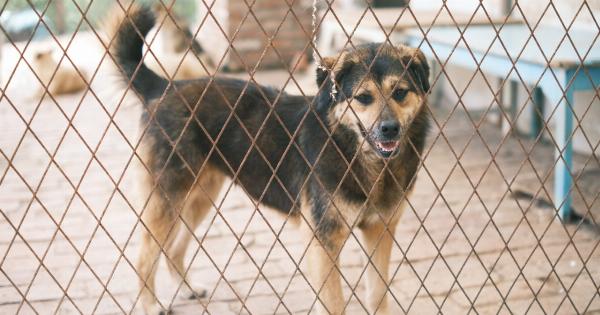Our dogs may not be able to communicate with words, but their body language and behavior can say a lot about how they feel and what they want.
Sometimes, dogs may be completely silent, but that doesn’t mean they aren’t trying to tell us something. Here, we will discuss some common reasons why your dog may be silent and what their silence could mean.
Hunger or Thirst
When your dog is hungry or thirsty, they may not vocalize their needs. Instead, they may sit or stare at their food or water bowl, or they may follow you around the house.
Some dogs may even start to chew or bite on furniture or objects in an attempt to relieve their hunger or thirst. As a responsible dog owner, it’s important to make sure your dog has access to fresh water and a proper diet to prevent these issues.
Fear and Anxiety
Dogs that are afraid or anxious may not make any noise at all. They may try to hide under furniture or stay still in one place to avoid any perceived danger.
This type of behavior can be triggered by many factors, such as fireworks, thunderstorms, or even strangers. If your dog is showing signs of fear or anxiety, it’s important to provide them with a safe and comfortable space and offer reassurance and affection.
Boredom and Loneliness
Some dogs become silent when they are bored or lonely. They may not have any toys to play with or excessive energy that needs to be burned off. This can lead to destructive behavior like chewing on furniture or barking excessively.
To prevent this, make sure your dog has plenty of toys and games to play with and exercise regularly.
Health Issues
If your dog suddenly becomes silent, it could be a sign of a health issue. They may be in pain or discomfort and may not be able to tell you. Other symptoms that could indicate a health issue include loss of appetite, lethargy, and a change in behavior.
If you suspect your dog may be experiencing a health issue, it’s important to take them to a veterinarian as soon as possible.
Territorial or Protective Behavior
Some dogs may become completely silent when they are on guard duty. They may be watching over their home or family and are ready to act if needed. This type of behavior is commonly seen in guard dogs or dogs that are protective of their family.
While it’s important to respect your dog’s need to protect, it’s also important to train them to respond to commands and interact appropriately with visitors and strangers.
Training and Obedience
During training sessions, your dog may become silent when they are trying to understand a new command or behavior. They may be concentrating or trying to figure out what you want them to do.
This type of silence is completely normal and is nothing to be worried about. However, if your dog is showing signs of frustration or fear, it’s important to take a break from training and try a different approach.
Affection and Love
Sometimes, your dog may choose to be silent when they are feeling happy and content. They may curl up next to you or lay their head in your lap, enjoying your company without any need or desire for noise.
This type of behavior shows that your dog is happy and comfortable around you, which is one of the greatest things you can provide as a pet owner.
Conclusion
Although dogs may not speak words like humans, their behavior and body language can tell us a lot about how they feel and what they want.
If your dog is showing signs of silence, it’s important to try and understand what they may be trying to communicate. Whether it’s a need for food or water, fear or anxiety, boredom, a health issue, or training and obedience, learning to understand your dog’s silence can help you provide the care and attention they need to live a happy and healthy life.




























